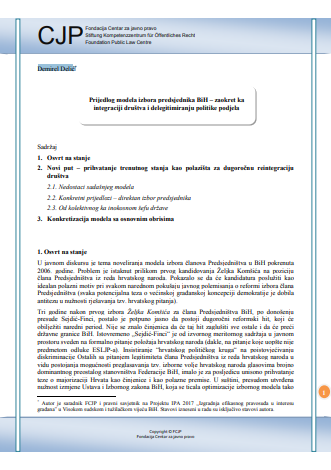Prijedlog modela izbora predsjednika BiH - zaokret ka integraciji društva i delegitimiranju politike podjela
Proposal of modality for election of the President of BiH - a turn towards the integration of society and how to arrange lack of legitimacy for politics based on division
Author(s): Demirel Delić
Subject(s): Politics, Constitutional Law, Public Law, Electoral systems
Published by: Fondacija Centar za javno pravo
Keywords: BiH; public law; president; elections; integration of society; division based politics;
Summary/Abstract: For the full ten years (the tenth anniversary of the Sejdić and Finci verdict), we witness the factual discrimination of the model used to elect the Presidency members. The perspective from which I analyze the necessarily forthcoming reform of the BiH Presidency's election model is the path to a country where all parts of the state are long-term oriented toward a common idea of a democratic rule of law. New modality for election of the president can be used for creating such a model that contributes to the creation of further divisions in society (on this idea, the ruling political nomenclature creates the existing system of the so-called coexistence of irreconcilable differences) or as an opportunity to strengthen the cohesion factor in the state. In the first next step, it is necessary to retain the direct election of the president, but with important corrections to the modality of election. Basically, I start with the thesis that one president is elected every four years by direct election. Such an idea, in principle, seems like a radical transition from the current collective composition to the typified democratic model - one head of the state. Electing one president in the country will, first of all, reduce the risks of possible dysfunctionality of the institution. Everyone has the right to be a candidate) from the entire BiH, with the winner being the highest-rated candidate (who won more than half the votes in the first election round, or the candidate who receives more votes in the second round). An additional condition is that, for the purposes of elections, (3) theoretical) electoral bases should be created that correspond to the areas in which the B / C / S dominant peoples currently reside, for the purposes of counting votes. According to these parameters, all municipalities with majority (50% + 1) members of a relevant constituent people would constitute a relevant electoral base. According to the four year rotation system, relevant electoral bases are also changing. The principle is based on three election cycles in which the various special electoral bases for counting the votes are relevant. In order for a candidate to be elected in the first round, apart from obtaining a majority of the votes, it is necessary that in the electoral area that is determined to be relevant for that election cycle (this is the base of municipalities with more than 50% of members of one of the constituent peoples) receives at least a sufficient number of votes (approximately 20%) from voters who actively participated in the electoral process, which would give it, in addition to general legitimacy, the partial legitimacy of that part of the population. In the case that there is no candidate in the first election who gets more than half of the total votes in the total electoral body (those who voted) and who simultaneously won at least 20% of the votes in the relevant basic electoral base (ethnocratic legitimacy), then a second round of elections is organized. The second election round would include two presidential candidates, who achieved the minimum required 20% of the vote in the primary election base. In the situation of organizing the second election cycle, simply applying the model of majority democracy would result in a newly elected president.
Series: Fondacija Centar za javno pravo - Analize
- Page Count: 11
- Publication Year: 2020
- Language: Bosnian
- Content File-PDF

